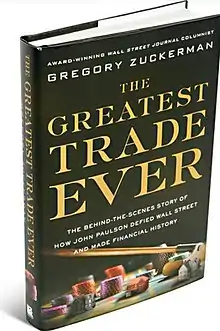The Greatest Trade Ever
The Greatest Trade Ever: The Behind-the-Scenes Story of How John Paulson Defied Wall Street and Made Financial History is a debut non-fiction book by American journalist Gregory Zuckerman.[1][2] The book was released on November 3, 2009, by Crown Business. The book investigates the reasons and consequences of the subprime mortgage crisis and the role that hedge fund manager John Paulson played in those events.[3][4]
 Hardcover edition | |
| Author | Gregory Zuckerman |
|---|---|
| Country | United States |
| Language | English |
| Subject | Financial crisis of 2007–08, Subprime mortgage crisis |
| Genre | Non-fiction |
| Publisher | Crown Business |
Publication date | November 3, 2009 |
| Media type | Print, e-book |
| Pages | 320 pages |
| ISBN | 978-0385529945 |
| OCLC | 651902245 |
| Followed by | The Frackers (2013) |
Overview
In 2006, John Paulson organized Paulson Credit Opportunity Fund that bet against bonds backed by subprime mortgages using credit default swaps.[5] Paulson "shot to fame and fortune" when his investment strategies paid off during the subprime housing market crash.[6] His bet against the subprime mortgage bubble has been called "the greatest trade ever" by Gregory Zuckerman.[7][8][9][10][11] Paulson's involvement in the Abacus-2007AC1 deals resulted in Goldman Sachs paying a $550 million penalty, the largest ever paid by a Wall Street firm.[12]
Recognition
The Greatest Trade Ever became a New York Times and Wall Street Journal best-seller and has since been translated into nine languages.
Reception
Heather Stewart of The Observer commented "Some of the best books about Wall Street – Michael Lewis's Liar's Poker, and Roger Lowenstein's When Genius Failed, for example – are packed with larger-than-life characters whom we end up either rooting for or loathing. Admittedly, Zuckerman's subjects offer him scant material, but the less-than-thrilling personal tales he recounts make this book better as a telling exposition of one aspect of the financial crisis than a gripping general read."[13] Ben Higgins of The Independent stated "The book mentions the moral question hanging over these deals a few times, but that's not really what Zuckerman, a Wall Street Journal staffer, is interested in. He's enthralled by the magnitude of markets, financial wizardy, and the personalities who did their homework and held their nerve."[14]
See also
References
- "The Greatest Trade Ever". Random House. Retrieved 7 February 2016.
- "The Greatest Trade Ever: The Behind-the-Scenes Story of How John Paulson Defied Wall Street and Made Financial History". Goodreads. Retrieved 7 February 2016.
- LEONARD, DEVIN (December 5, 2009). "Economy's Loss Was One Man's Gain". The New York Times. Retrieved 7 February 2016.
- Wahl, Daniel (20 May 2010). "Review: The Greatest Trade Ever, by Gregory Zuckerman". The Objective Standard. Retrieved 7 February 2016.
- Zuckerman, Gregory (2009). The Greatest Trade Ever: The Behind-the-Scenes Story of How John Paulson Defied Wall Street and Made Financial History. New York: Crown Publishing Group. pp. 123–4. ISBN 978-0-385-52994-5. Retrieved 25 January 2014.
- Reuters Paulson Loses More Sept Fund Now Off 47%, Svea Herbst-Bayliss, Oct 8 2011, Retrieved Feb 2016
- "Top 10 greatest trades of all time". International Business Times. 6 January 2011. Retrieved 26 March 2012.
Paulson does indeed deserve the title of having made the greatest trade ever.
- Zuckerman, Gregory (2009). The Greatest Trade Ever: The Behind-the-Scenes Story of How John Paulson Defied Wall Street and Made Financial History. New York: Crown Publishing Group. ISBN 978-0-385-52994-5. Retrieved 26 March 2012.
- Corbett, Jeff (Apr 28, 2010). "John Paulson: Goldman Scandal's Real Ringmaster?". real estate aol.com. Retrieved 29 June 2014.
- Taibbi, Matt (April 26, 2010). "Feds vs. Goldman". Rolling Stone. Retrieved 29 June 2014.
- Fiderer, David (18 March 2010). "The Moral Compass Missing From The Greatest Trade Ever". Huffington Post. Retrieved 29 June 2014.
- "Goldman Sachs to Pay Record $550 Million to Settle SEC Charges Related to Subprime Mortgage CDO". Securities and Exchange Commission. 15 July 2010. Retrieved 5 June 2015.
Goldman failed to disclose to investors vital information about the CDO, known as ABACUS 2007-AC1, particularly the role that hedge fund Paulson & Co. Inc. played in the portfolio selection process and the fact that Paulson had taken a short position against the CDO.
- Stewart, Heather (7 March 2010). "The Greatest Trade Ever: How John Paulson Bet Against the Markets and Made $20 Billion by Gregory Zuckerman". The Observer. Retrieved 25 May 2019.
- Higgins, Ben (1 August 2010). "The Greatest Trade Ever, By Gregory Zuckerman". The Independent. Archived from the original on 2022-06-18. Retrieved 25 May 2019.